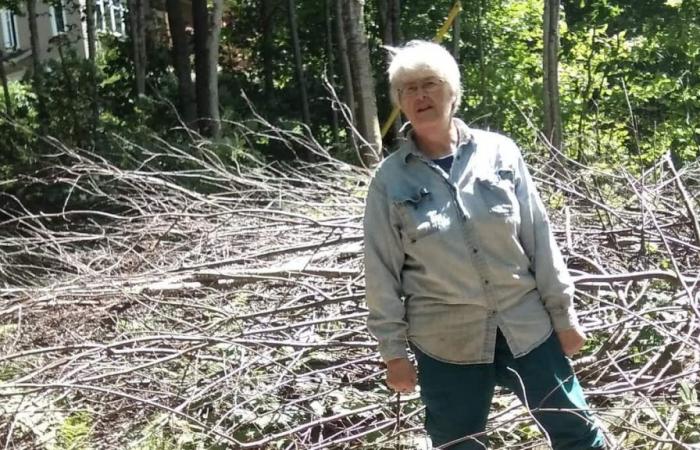Large piles of “horrible” debris are still lying around on the property of a Laurentians resident three months after Hydro-Québec carried out pruning work on her home. With the return of warm weather, she fears that the dead wood will become the source of a fire if nothing is done.
• Read also: Hydro-Québec plans to charge costs to property owners who refuse tree cutting on their land
• Read also: A fine of $1,426 for a tree cut by Hydro-Québec without the City’s permission
• Read also: Hydro-Québec will no longer need permission to cut down trees on your home
“Leaving piles of branches on the ground like that is like throwing fuel on the fire, when we know that the summer will be hot and dry,” says Lena Measures, a lady from 74 years old who lives in a house surrounded by trees in the municipality of Morin-Heights.
Last March, pruners mandated by Hydro-Québec came to cut branches that posed a risk to the power lines on his property.
“I find it an important job, because there are many power outages in the region due to falling trees and branches during storms,” agrees M.me Measurements. But not picking up anything is a lack of respect and it’s dangerous.
“The pile of tangled branches smothers the natural plant cover, killing in particular the small conifers that I had planted. And frankly, the debris is a horror to look at,” adds the Laurentian.
In the name of the environment?
Called to react, Hydro-Québec explained that the decision to collect branches depends on the circumstances and the nature of the interventions.
The debris is shredded and recovered by the state company when the cut trees are on “developed” land, while they are scattered on the ground or piled up in small mounds when they are “without” trees. commercial or ornamental value,” for example in a roadside forest, said a spokesperson, Cendrix Bouchard, by email.
“By applying these measures, Hydro-Québec achieves substantial savings, because the recovery and elimination of tree residues can represent almost half of the total costs linked to the clearing of lines and the protection of the network,” a- he added, ensuring that this approach “does not increase the risk of fire” and has “long-term” benefits for biodiversity.
“Trees that are limbed or simply left whole provide long-lasting shelter for wildlife and invertebrates […]and dead wood of larger diameter promotes the germination of certain plant species and plays a role in water retention and erosion control,” argued Mr. Bouchard.
Feeling of helplessness
This explanation doesn’t hold much water in the eyes of Lena Measures, a career biologist with a doctorate in the field.
“Hydro-Québec managers should take a course in biology and ecology,” she quips. “Many trees have had their tops cut off with no lower branches or leaves – these trees are unlikely to survive. Trees are valuable as carbon sinks, absorbing greenhouse gases. Piles of branches decompose over the years, releasing greenhouse gases.”
Faced with Hydro’s refusal to collect the dead wood, Mme Measures took steps to try to do it on her own, but renting a shredder proved impossible because the device was “too heavy for her car.” The debris is therefore there for good.
“I have no control over the situation. I threatened to stop paying my electricity bills, but that won’t do anything, they will just cut me off,” laments the septuagenarian.
Do you have any information to share with us about this story?
Write to us at or call us directly at 1 800-63SCOOP.






